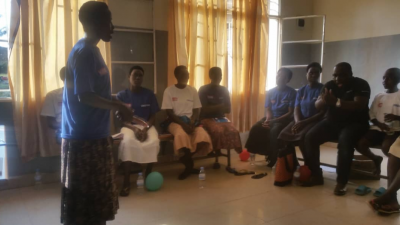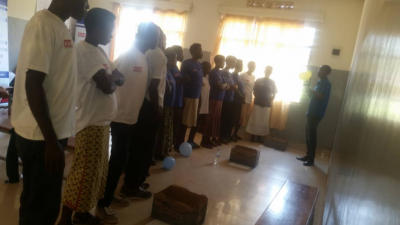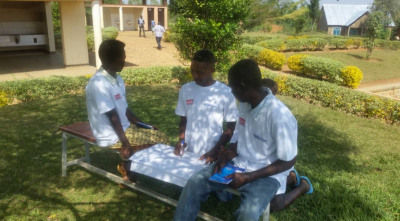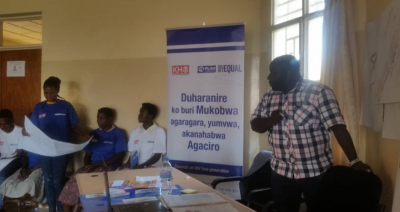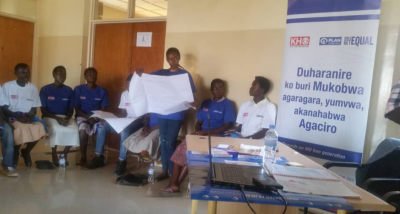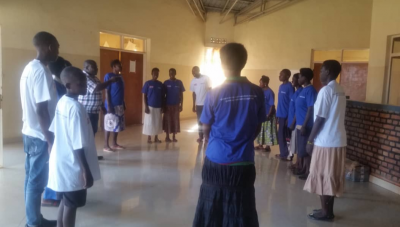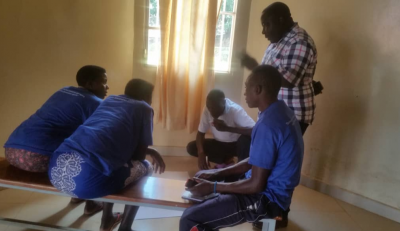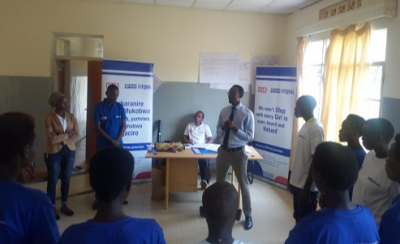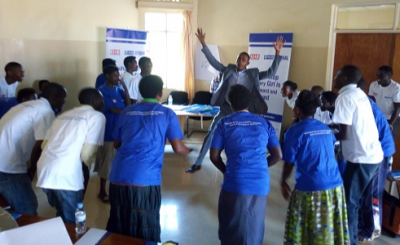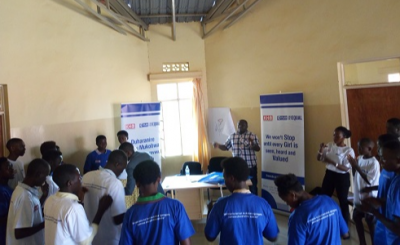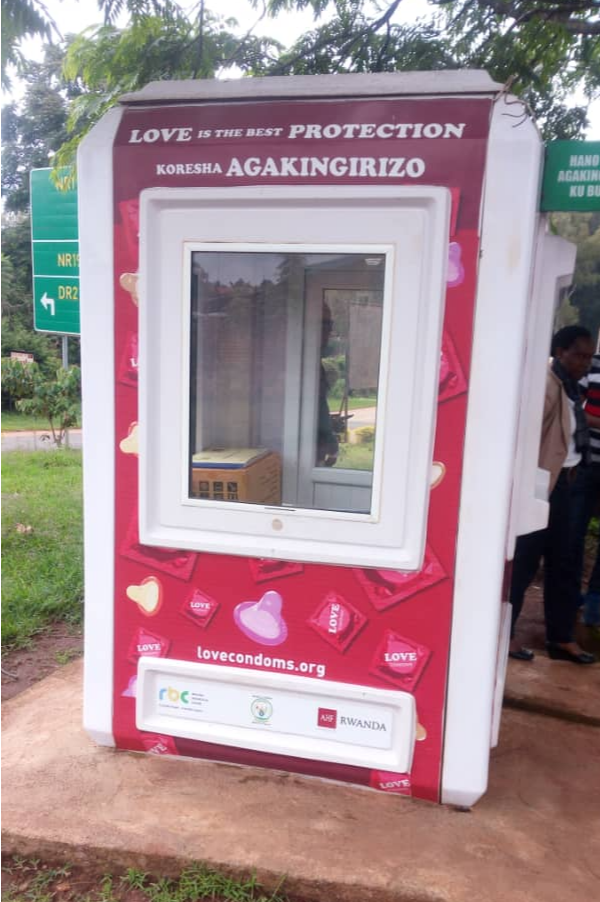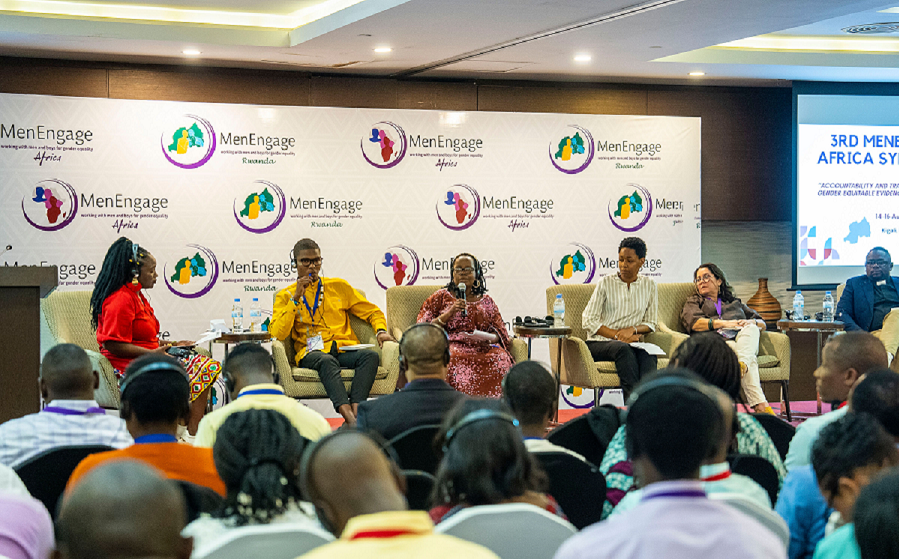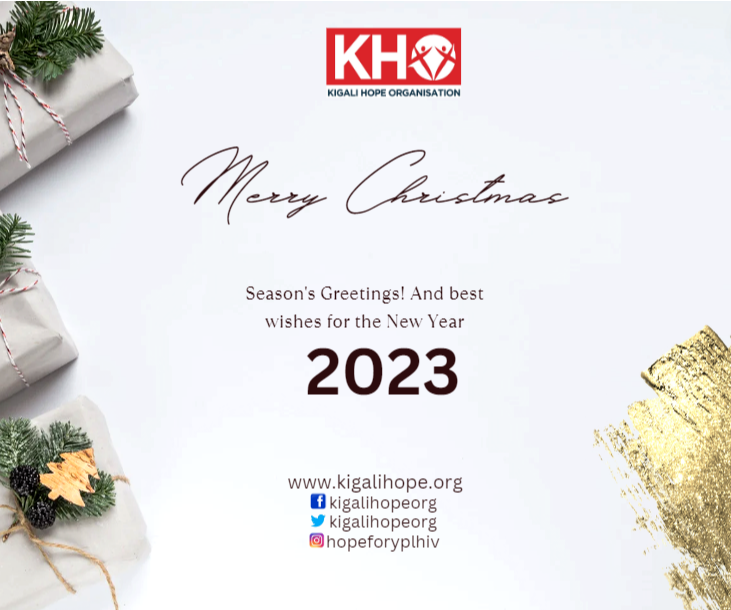
Details
Place of implementation: BUGESERA DISTRICT
NGERUKA HEALTH CENTER
Project title: GILS GET EQUAL CAMPAIGN: “Girls
and young people living with HIV get respect”
Period of implementation: July 2019
1.
BACKGROUND
Kigali Hope Organization
(KHO) is a Rwanda Civil Society Organization whose members and beneficiaries
are young people living with HIV. KHO activities have been targeted towards
advocacy, HIV prevention, Mobilizing YPLWH to form support groups to improve
their livelihoods and there by actively participating in the HIV response
through different programs including: Primary prevention, Human rights
promotion and AIDS impact mitigation.
Plan International Rwanda,
a development and humanitarian organization that advances children’s rights and
equality for girls will launch a new campaign dubbed ‘Girls Get Equal’ aimed at
increasing girls’ and young women’s power, voice and leadership as a way of
advancing their equality. It is using this approach to transform unequal gender
power relations and bringing about significant and sustainable change so that
girls can learn, lead, decide and thrive. The campaign was initiated and
launched last year 2018 by Plan International globally to address the root
causes of gender inequality by focusing on how and where discrimination and
stereotyping hold women and girls back in different areas like education,
health, economic participation and opportunity as well as political
empowerment.
It will empower girls and
young women to move with confidence to make crucial decisions affecting their
lives, freedom to move, live and speak up without the threat of violence and
harassment as well as storytelling to share diverse stories of Girls’ power. The
social change campaign slogan is ‘We won’t stop until girls are seen, heard and
valued”.
It is in that regards
Kigali Hope Organization was selected to implement some activities targeting
young people living with HIV in Begesera District at Ngeruka Health center
specifically.
2.
ACTIVITIES OBJECTIVES
“Girls Get Equal Campaign: Girls
and young women living with HIV get respect” PROJECT was conducted to attain
the following objectives:
ü
Girls and Young people living with
HIV get power to make crucial decisions about their lives
ü
Girls and young people living with HIV
get freedom to move, to live and to speak up without stigma and
discrimination
ü
Girls and young people living with HIV
get the ability to share stories of Girls’ power and be role models for HIV+
peers and get ability to advocate for the improvement of lives of other
vulnerable young people
ü
Girls and young people living with HIV
get ability to work for their future as citizens of our country.
3.
IMPLEMENTED ACTIVITIES
ü
Training on Sexual reproductive health
and rights
ü
Training in how to fight and deal with
stigma and discrimination (testimonies sharing was the strategy)
ü
Workshop on financial fitness
4.
STRATEGIES USED DURING THE
IMPLEMENTATION
ü Testimonies sharing
ü Focus group discussion
ü Story telling
5.
IMPLEMENTATION OF PLANNED
ACTIVITIES
The conducted activities were in general
successful and it took us 3 days for realization. All planned activities were
conducted with and at Ngeruka Health Center. In total 20 girls and boys
aged between 15-25 years old was present and among them 13 girls.
The training was starting each day of the 3 days from 8 AM in the
morning to 4pm evening.
Opening remarks was delivered by KAYUMBA AIME, the legal
representative of KHO. He talked about the organizing organization (PLAN
International and KHO) and particularly about the project “Girls Get Equal”. He
stressed on the importance of the training and the role of participants as well
as their involvement for the success of the training.
Two days Training include Topic /Sessions on Sexual, reproductive
health and rights, testimonies exchanges. And the third day we had a
workshop on financial fitness.
DAY 1: 18th July
2019:
SEXUAL AND REPRODUCTIVE HEALTH AND
RIGHTS SESSION
This topic was new to the participants, as it was never
discussed before. Participants was excited to hear and understand all
about Sexual Reproductive Health and Rights , as revealed that they still have
and believe in false information and taboos (a young girl can only be pregnant after 7 days of menstruation,
men become sexually impotent because of their sperm stolen by women, etc). The trainer disclosed all information regarding to SRH, and
remove all false believes by deep explanation, examples and teaching
materials demonstrations and provided answers to the asked questions.
At the end of this session it was noticed
through a quick evaluation, that at least 14 out of 19 trainees had well
understood the themes developed on ASRH.
WOMEN AND GIRLS PERIOD CYCLE (MENSTRUAL
CYCLE):
No information ever
discussed before, about Menstrual Cycle, it was just new topic, Participants
was introduced the significance and use of awareness of this by using examples,
group exercise and presentation.
It was noted that only
young people who went to school were able to understand how to calculate their
menstrual period.
DAY 2: 19th July 2019
CONDOM USE (WITH DEMONSTRATION):
Youth are mostly vulnerable in sex intercourse, most of the time
they involve in non-protect sex intercourse that lead to unexpected
pregnancies, new HIV infections as well as other STIs.
Participants were very eager to learn as it was the first time
aware of condom demonstration, usage, and how it protects in sexual
intercourse. The session was practical demonstration by using teaching
materials and mostly engages girls in practical exercises.
HIV ADHERENCE AND POSITIVE LIVING TESTIMONY:
There are a number of key issues in the follow up of patient (or
young people living with HIV) on adherence to antiretroviral therapy, including
accurate measurement of adherence, assessment of the impact of adherence on
viral load and clinical outcome, determination of the factors that affect
adherence, and the development of interventions. Addressing these issues may
provide valuable information about which patients are most at risk for
non-adherence and about how adherence might be improved. The critical factors
that influence adherence fall into 4 main groups: (1) patient factors, such as
drug use, alcohol use, age, sex… (2) Medication regimen, such as dosing
complexity, number of pills, or food requirements; (3) the patient-health-care
provider relationship; and (4) the supportive care system.
Testimony sharing makes youth living with HIV have attention in
decision making, and make a comparison between himself / herself with someone
who is giving testimony through inspiring story. The young person is motivated
to choose the winning way (manner, methods…) and do whatever it takes to
suppress viral loads. Self-development, fight with stigma and discrimination
and have a positive mind lead always to positive living.
ENTREPRENEUR MIND SET:
Having entrepreneur mind set is a key for positive living of the
youth living with HIV, most of participants are in agriculture domain, they do
it for survive, not for business. This session focused on boosting youth mind
set by starting small business using available startup capital, either thinks
about cultivating for the business purpose or livestock business.
BUSINESS IDEAS STIMULATION:
This session also helped for ideas stimulation, where each
participants start thinking about the small business he/she can start by using
surrounded opportunities and available resources, market study and innovation.
This session was very practical with small group discussions and presentations.
DAY 3: 25th JULY 2029
FINANCIAL FITNESS
On this day, the participants had a chance to discuss about how
they can improve their lives and at the same time their adherence to HIV
treatment. The trainer tried to motivate them into forming a saving group as a
starting point. In the past young people living with HIV at Ngeruka Health
Center have never met before for any reason may it be for treatment or any
other. So, forming a saving group may be a catalyzing step for them to meet
regularly for a continued social supporting initiative that could lead to good
adherence to HIV treatment, for instance.
Consequently the participants came up with an idea of saving the
money that were given to them as transport during the training and use it for
their development. 17 young people of them decided to start immediately and
even we helped them to acquire information on how they can open a bank account
at SACCO Ngeruka. At the moment the account is opened and 170,000RWF has been
deposited on that account. Young people are now getting prepared to have an
income generating activities.
This account will be used as saving tool, management of the fund,
accuracy of transaction done, avoid fund embezzlement and safety. The deposits
and withdrawal will be done based on consent of each member through written
meeting resolutions.
CONNECT GROUP TO HEAD OF H.C FOR FUTURE
ASSISTANCE, SUPPORTS AND ADVICE:
The head of health center promised to the group good cooperation for
much need advices and guidance, opportunities sharing and keeping the recording
materials of the group and its safety inside the health center where the group will
operating.
CHALLENGES
ü
A the
beginning of the training, young people were very shy because it was for most
of them the first time to see each other so it was impossible for them to open
up themselves for a constructive discussion
ü
To
connect with local authorities was not easy for us as an organization because
the communication about the collaboration with PLAN Rwanda was not communicated
to the local leaders before the start of the implementation
RECOMMENDATIONS AND
WAYFORWARD
ü
Adherence
to treatment among young people living with HIV is still a challenge. And at
Ngeruka health center young people should be encouraged to have good adherence.
ü
It has
been noticed that young people have difficulties to access condoms (at Ngeruka
Health center) and in order to meet this need, it would be necessary for KHO to
regularly supply condoms to young corner at Health center level.
ü
We
noticed that in health centers (in rural areas) are more likely to ignore the
needs (need of information about sexual and reproductive health, about how to
cope with stigma and discrimination, HIV treatment adherence, unwanted
pregnancies,…) of young people living with HIV
ü
To
reinforce knowledge gained on SRH, training refresher should be organized after
at least three months.
ü
Young
people will be messengers among their peers to help reduce or stop HIV
transmission
ü
There
should be more initiatives that involve all health centers where PLAN
International Rwanda operate in Rwanda (Bugesera, Gatsibo, Nyamagabe…) because
as from the experience we had during the last month at Ngeruka Health center,
young people living with HIV are neglected in terms of providing them the very
much needed information about Sexual and reproductive health and rights,
unwanted pregnancies, the role of young boys in the fight of HIV and new
infections (As girls and young women infected with HIV are 5 times many than
their brothers)
ü
Formed
saving group needed the basic assistance and advice include guidance in
group development, the significance of joining forces, the better way to choose
the sustainable business idea, group management and member’s future outcomes
PLAN Rwanda needs in the future to organize a
coordination meeting with local leaders including District representatives and
other decision makers in order to inform them about new collaboration about
other project implementers in the District.


